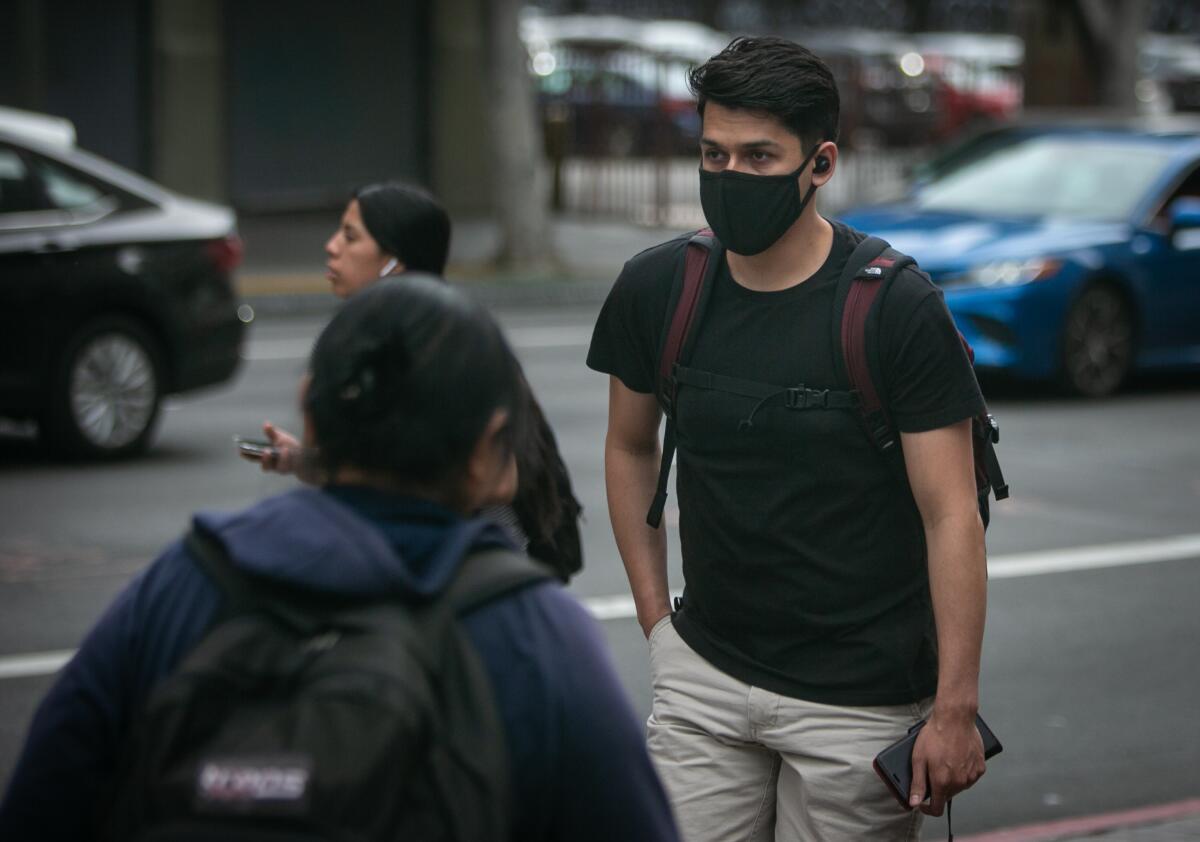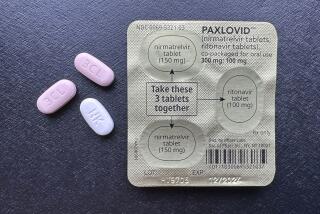Yes, we’re all tired, but keep that mask on

- Share via
Will COVID-19 ever go away? Americans were so-so about staying at home during the first couple of months, but our discipline has relaxed, and infection rates are trending perilously upward. We still need masks and social distancing and a lot of hand-washing. Toilet paper has returned to the shelves. But when, if ever, can people safely go back to their workplace, send their kids to school or plan a big Thanksgiving dinner?
President Trump’s politicization of mask-wearing is partly to blame, but there are other reasons some people, especially younger Americans, are losing confidence in face coverings. A vaccine is probably a long distance away, if one is even found. Why not just allow nature to take its course and let most people to get sick so there’s herd immunity?
Two good reasons: First, it’s not clear that herd immunity can happen without a vaccine. In fact, it’s not known yet whether COVID-19 survivors are immune, or if they are, for how long.
Second, according to the Mayo Clinic, more than 200 million Americans would have to catch and survive the illness for herd immunity to occur. Already, COVID-19 has killed twice as many Americans as the flu did this past season. Letting it run rampant would mean millions more deaths — a price far too high to pay.
Besides, there are good reasons to keep those masks on for months to come.
The problem is that we’re thinking in all-or-nothing terms. A scenario in which almost all of us get COVID-19 until none of us do. Or one in which we’ll have to breathe through triple layers of cotton stuffed with coffee filters for years.
Left out of this equation is the possibility of treatments coming on board that might greatly reduce the fatality rate of the disease. Even if we can’t get rid of the new coronavirus for now, we might find ways to live with it, and even go have a drink at a bar.
The public, understandably enough, has stopped talking much about treatments for COVID-19. Hydroxychloroquine, so heavily promoted by Trump, turned out to be a dud. Then infectious disease expert Dr. Anthony Fauci sang the praises of remdesivir after a robust study showed it reduced hospitalization time by a few days. That’s helpful, especially if hospitals become overcrowded, but not a real lifesaver.
Those were the famous ones, but a host of less-noticed treatments are working their way through the clinical trial system. (Disclosure: Dr. Patrick Soon-Shiong, the surgeon and bioscientist who owns the Los Angeles Times, is one of many scientists trying to develop an effective vaccine.)
A large study out of Oxford University found that dexamethasone, a cheap and widely available steroid, brought the death rate down by a third among patients who were on ventilators. The study still hasn’t been peer-reviewed or published and more research is needed, but with no other treatment available for the most critically ill patients, British hospitals have turned to it as well as some U.S. hospitals.
The steroid is one of many drugs being examined for their ability to quell cytokine storms, the acute immune-system reactions that so often make COVID-19 deadly. There are two stages in the severe cases, doctors explain: The first week or so, when a robust immune response helps fight off the virus, is sometimes followed by a relapse in which the immune response goes into overdrive, causing life-threatening problems.
Other steroids and additional treatments might tamp down those immune system reactions in more targeted, effective ways.
Meanwhile, an early and small study on the use of blood plasma from patients who have recovered from COVID-19 did not find it helpful. The idea was that the antibodies they had developed might work for the newly sick. But more studies are underway and scientists are working on developing monoclonal antibodies. And though remdesivir hasn’t shown lifesaving prowess, researchers are examining additional antiviral medications. These drugs generally are most helpful early on in viral diseases, reducing their severity and length.
The chances of a cure are slim, but what if there were an array of medical tools that might reduce the COVID fatality count closer to that of flu? Drugs and other treatments follow a shorter approval timeline than vaccines, in part because they’re given to the already ill instead of to healthy people.
Of course, we’ve had big hopes for treatments or cures that haven’t panned out. But it’s only been a few months. If we prevent spread now by keeping masks on while figuring out how to bring down the disease’s death toll over the long term, we become the people who saved millions of lives.
More to Read
A cure for the common opinion
Get thought-provoking perspectives with our weekly newsletter.
You may occasionally receive promotional content from the Los Angeles Times.









